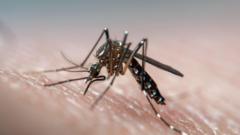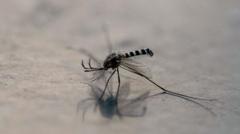In a groundbreaking study, researchers from the University of California, Irvine have devised an unconventional strategy to combat the transmission of diseases such as dengue, yellow fever, and Zika by rendering male mosquitoes deaf. This significant development exploits the fact that male mosquitoes typically rely on their hearing to pursue females, responding to the distinctive sound of their wingbeats while flying.
By targeting a specific genetic pathway responsible for hearing in male Aedes aegypti mosquitoes, which are accountable for infecting around 400 million people annually, the research team successfully created a breed of mosquitoes that cannot hear. This was achieved through manipulating a protein vital for sound detection, resulting in a group of male mosquitoes who continued to coexist with females in a controlled environment for three days without any physical mating attempts.
Notably, while mutated male mosquitoes displayed no interest in copulation, their wild counterparts were able to mate effectively and fertilize nearly all females present. The implications of this research were pronounced, as scientists noted that the inability of deaf males to hear and pursue females could lead to a substantial decline in mosquito populations.
Expert opinions have endorsed the validity of the findings. Dr. Joerg Albert from the University of Oldenburg emphasized the potential of disrupting mosquitoes' auditory capabilities as a viable avenue for pest control. While he acknowledged that this approach represents a promising advancement in reproductive studies, he also cautioned that it warrants further investigation and management.
Meanwhile, another method of mosquito control under review involves the release of sterile males in regions experiencing outbreaks. It is crucial to approach mosquito eradication cautiously, given their ecological roles as food sources for various species and as pollinators, thereby maintaining the balance within ecosystems. The study findings have been published in the journal PNAS, potentially paving the way for innovative strategies in vector management.
By targeting a specific genetic pathway responsible for hearing in male Aedes aegypti mosquitoes, which are accountable for infecting around 400 million people annually, the research team successfully created a breed of mosquitoes that cannot hear. This was achieved through manipulating a protein vital for sound detection, resulting in a group of male mosquitoes who continued to coexist with females in a controlled environment for three days without any physical mating attempts.
Notably, while mutated male mosquitoes displayed no interest in copulation, their wild counterparts were able to mate effectively and fertilize nearly all females present. The implications of this research were pronounced, as scientists noted that the inability of deaf males to hear and pursue females could lead to a substantial decline in mosquito populations.
Expert opinions have endorsed the validity of the findings. Dr. Joerg Albert from the University of Oldenburg emphasized the potential of disrupting mosquitoes' auditory capabilities as a viable avenue for pest control. While he acknowledged that this approach represents a promising advancement in reproductive studies, he also cautioned that it warrants further investigation and management.
Meanwhile, another method of mosquito control under review involves the release of sterile males in regions experiencing outbreaks. It is crucial to approach mosquito eradication cautiously, given their ecological roles as food sources for various species and as pollinators, thereby maintaining the balance within ecosystems. The study findings have been published in the journal PNAS, potentially paving the way for innovative strategies in vector management.






